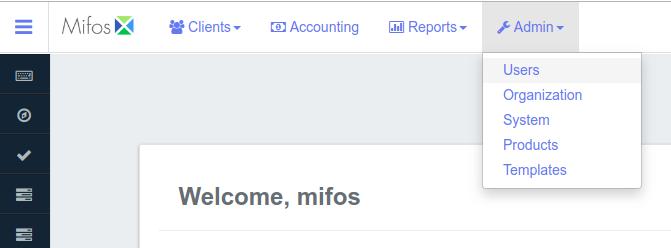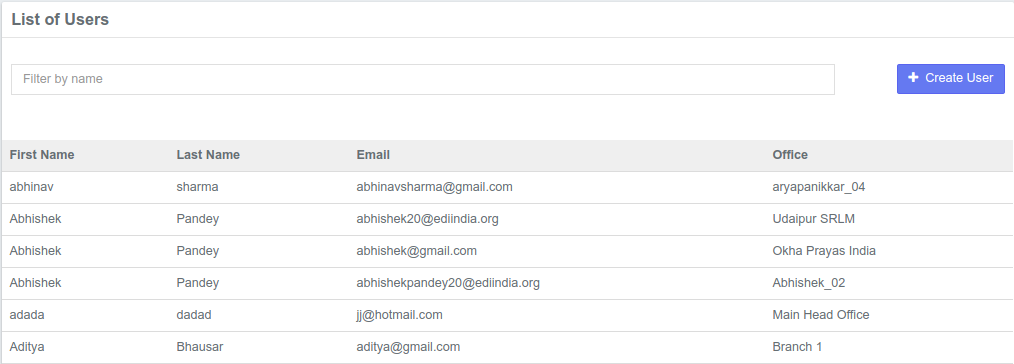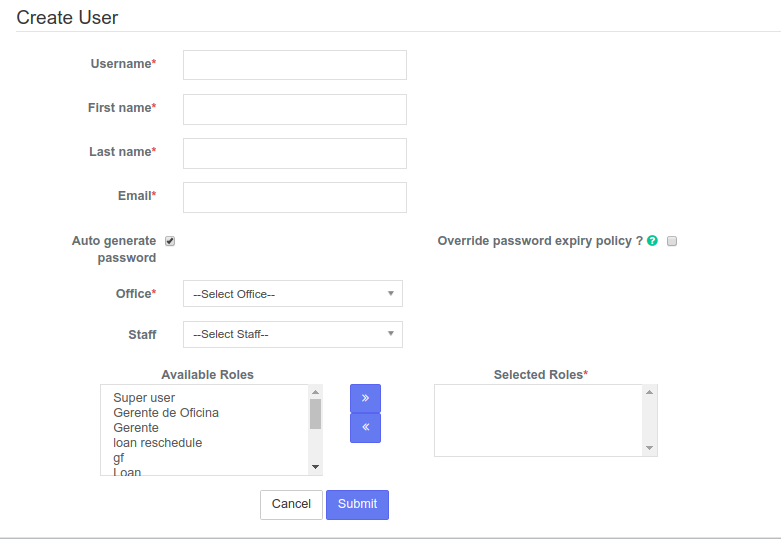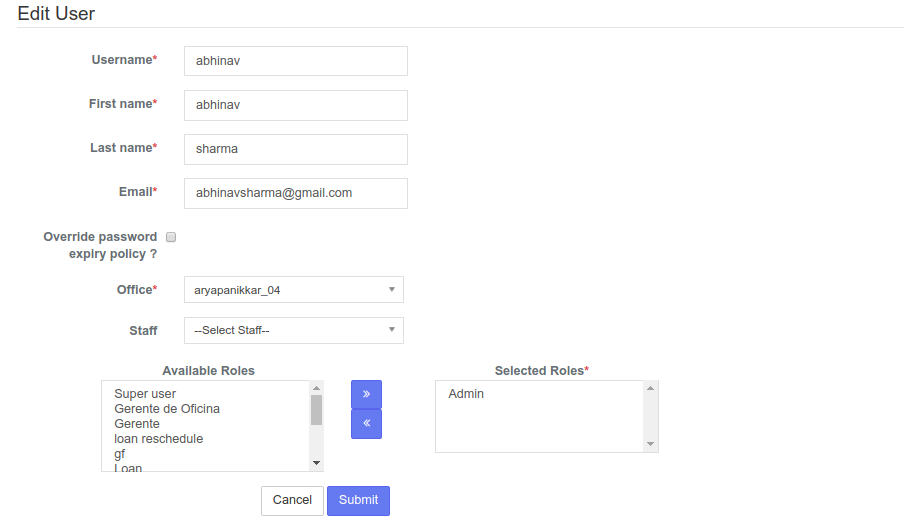Versions Compared
Key
- This line was added.
- This line was removed.
- Formatting was changed.
Application users are people who work for your organization and will be using Mifos X to track all the information about your organization's operations. For example, an accountant working at a branch needs a user account in this application to track all the accounting related tasks and information. Similarly, a branch manager needs a user account to manage his/her client's portfolios.
In this section, you will learn how to add, delete or modify your organization’s users. These are people with system access working at the offices within your organization. They are subject to different restrictions based on the roles assigned to them (by the system administrator).
Before setting up usernames, the organization should give thought to the standard that will be used throughout the organization. This may be first.lastname; it may be a numerical identifier such as 101lastname (indicating the main office) or 201lastname indicating a branch office. Whatever the method adopted by your organization, it should be consistently used when creating users.
From the main screen, click on Admin then select Users from the drop down list.
Image Removed
 Image Added
Image Added
This will launch the users page that displays a list of Users with their details such as;
- First name
- Last name
- Office
 Image Added
Image Added
Tip: Use the Filter by Name feature at the top of the screen to save time scrolling. Just begin typing the name you are looking for and Mifos X will narrow the search for you.
Create a user
Tip: Before you start to create User, Please please ensure to have created respective Role- (Manage Roles and Permissions).
Launch this process by clicking on the blue Create User button  at the top-right of the Users screen. You will then be prompted to fill in a series of fields and define the new user's office and role(s):
at the top-right of the Users screen. You will then be prompted to fill in a series of fields and define the new user's office and role(s):
- Username
- First Name
- Last Name
- Office
- Selected Roles
 Image Added
Image Added
- By default, Auto generate password will be check boxed. It will send an auto generated password to the provided Email ID.
or - Alternatively, un-checking the box will enable you provide a password manually. This will give you access to the Password and Repeat Password fields that allow you to create your own password.
Image Removed
 Image Added
Image Added
- Select the associated office of this user from the drop-down menu:
Image Removed
 Image Added
Image Added
- Select a role (s) from the multi-choice menu. To select Available Roles menu to be added to the Selected Roles section by clicking the
 Image Added button. To add more than one role at once, hold the Ctrl key while clicking on the appropriate roles. Selected roles while be highlighted in blue and then you can forward all to the Selected Roles section.
Image Added button. To add more than one role at once, hold the Ctrl key while clicking on the appropriate roles. Selected roles while be highlighted in blue and then you can forward all to the Selected Roles section.
 Image Added
Image Added
- To remove a role from the Selected Roles section, select the role and click the
 Image Added button.
Image Added button.
 Image Added
Image Added
Once the information is complete, click the Submit button.
A list of users created within your organization will be generated in a chart. Information included in the chart will be;
First NameImage Removed
Tip: Use the Filter by Name feature at the top of the screen to save time scrolling. Just begin typing the name you are looking for and Mifos X will narrow the search for you.
View Application UsersView User's Profile
To view a user, click on their name on the chart list and this will open up their profile. There will be additional information displayed such as:
- Login Name
- Roles assigned to this user
Image Removed
 Image Added
Image Added
Once you have opened a user's profile, you are able to perform the following actions:
- Edit user
- Delete user
- Change a password
Edit User
You may edit the profile of current users within your organization. Follow these steps to do so:
- Navigate to the chart of current Users - If you are not sure how, please see the View Application Users section of this manual.
- Select the user you would like to edit by clicking on their name in the chart, which will launch their profile.
- Click the blue Edit button
 at the top-right of the page. This will open the user's profile, allowing you to make several changes.
at the top-right of the page. This will open the user's profile, allowing you to make several changes.
 Image Added
Image Added
Once you have opened the user's profile for editing, you may change several things such as:
- Username
- First and last name
- Selecting staff that report to this user by using the drop-down menu marked Staff:
Image Removed
In addition, there are two more options for editing a user profile:
Add/Remove User Role
- Use the multi-choice menu labelled Select roles to add or remove roles for this user :- hold the Ctrl key while clicking to select multiple roles. Selected roles will be highlighted in blue:
Image Removed
 Image Added
Image Added
- Transfer user account from one office to another
- Using the Office dropoffice by selecting the office drop-down menu, select the appropriate office for this user.
Image Removed
- Click .
After making changes, click Submit.
Change User Password
- Navigate to the chart list of current Users - If you are not sure how, please see the View Application Users section of this manual.
- Select the user whose password you would like to change by clicking on their name in the chartlist. This will launch their profile.
- Click the blue Change Password button
 at the top-right of the page.
at the top-right of the page. - This will launch a pop-up window:
- Fill in the Password and Repeat Password fields.
- Click Submit.
Delete
userUser
- Navigate to the chart of current Users - If you are not sure how, please see the View Application Users section of this manual.
- Select the user you would like to delete by clicking on their name in the chart. This will launch their profile.
- Click the blue Delete button
 at the top-right of the page.
at the top-right of the page. - Click Confirm.
Override password expiry policy ?
Determines whether the password does not expire for this user even if global configuration for password expiry is enabled.
This means that checking the check box will grant you access using the same password regardless of whether global configuration for password expiry is enabled.
Image Removed
 Image Added
Image Added
Related articles
| Filter by label (Content by label) | ||||||||||||||||||
|---|---|---|---|---|---|---|---|---|---|---|---|---|---|---|---|---|---|---|
|
| Panel | ||||||||
|---|---|---|---|---|---|---|---|---|
On this page:
|
| Child pages (Children Display) | ||||
|---|---|---|---|---|
|